It is often said that more words have been written about Abraham Lincoln than any other person in history, except for Jesus and Shakespeare. This is especially true when it comes to books about Abraham Lincoln.
In fact, according to an article in the New York Times, no one knows exactly how many books about Lincoln have been published.
Yet, some people have ventured to guess, such as one prominent book collector who estimates there have been at least 7,000 books published on Lincoln. Yet, Bookmarks Magazine reports a much higher number of at least 16,000 books.
With so many books to choose from it can be hard to know which books to read or where to start. That’s why I’ve compiled a short list of some of the best books about Abraham Lincoln.
Keep in mind, these aren’t the only Lincoln books that you should read, but if your time and/or money is limited, these are definitely the must-read Lincoln books.
The books listed here are best-sellers on the topic, have received great reviews from critics and historians, have won numerous literary awards, such as the Pulitzer Prize and the Lincoln Award, and have great reviews on sites like Amazon and Goodreads.
The following is a list of the best books about Abraham Lincoln:
(Disclaimer: This article contains Amazon affiliate links. As an Amazon Associate I earn from qualifying purchases.)
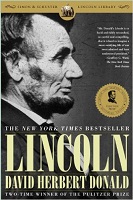 1. Lincoln by David Herbert Donald
1. Lincoln by David Herbert Donald
Published in 1995, the book chronicles Lincoln’s slow and gradual climb from a rural rail splitter to President of the United States.
The book not only highlights the events of Lincoln’s life but also the development of Lincoln’s personality and character and, in doing so, explores what made it possible for someone so inexperienced and unprepared to become the great leader that he did.
While many Lincoln biographies also discuss the events of the Civil War, the economic and social issues of the time and the general history of the 19th century, this book focuses exclusively on Lincoln himself, his actions, attitude and etc. The book has been described by many critics as the quintessential Lincoln biography.
Geoffrey C. West reviewed the book for the New York Times and described it as compelling and well-researched:
“But Mr. Donald’s ‘Lincoln’ is so lucid and richly researched, so careful and compelling, that it is hard to imagine a more satisfying life of our most admired and least understood President, at least for the foreseeable future…Mr. Donald’s life of Lincoln is different and therefore more rewarding; it unrolls, as Lincoln’s real life did, as a series of abrupt twists and turns, triumphs and setbacks, after any one of which, had he made the wrong choice, he would never have had his chance at greatness.”
Historynet.com declared the book “the finest single volume on Lincoln’s life yet attempted, a work that is a monumental achievement in scholarship…Donald’s Lincoln will undoubtedly displace popular Lincoln biographies by Benjamin P. Thomas and Stephen B. Oates as the definitive modern study.”
The website BestPresidentialBios.com says that although they are not sure if the book is the best single-volume biography ever written on Abraham Lincoln that many critics claim it is, the site does state that it “is nevertheless extremely meritorious.”
David Herbert Donald, who died in 2009, was a history author who wrote numerous books about Lincoln such as Lincoln Reconsidered: Essays on the Civil War Era; We Are Lincoln Men: Abraham Lincoln and His Friends; and Lincoln at Home: Two Glimpses of Abraham Lincolns Family Life.
Donald won a Pulitzer Prize in 1961 for his book Charles Sumner and the Coming War and won the Pulitzer Prize again in 1988 for his book Look Homeward: A Life of Thomas Wolfe. Donald was inducted as a Laureate of The Lincoln Academy of Illinois and won the Order of Lincoln award from the State of Illinois in 2008.
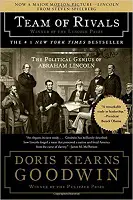 2. Team of Rivals: The Political Genius of Abraham Lincoln by Doris Kearns Goodwin
2. Team of Rivals: The Political Genius of Abraham Lincoln by Doris Kearns Goodwin
Published in 2005, this best-selling book discusses Lincoln’s presidential cabinet, which was made up of Lincoln’s former political rivals, and explores how they helped shape one of the most significant presidencies in American history.
The heart of the book is about how Lincoln persuaded his former rivals to let go of their grudges against him and become his allies in order to fight for the greater good of the country, as Goodwin explains in the introduction:
“This, then, is a story of Lincoln’s political genius revealed through his extraordinary array of personal qualities that enabled him to form friendships with men who had previously opposed him; to repair injured feelings that, left unattended, might have escalated into permanent hostility; to assume responsibility for the failures of subordinates; to share credit with ease; and to learn from mistakes.”
Fellow Lincoln biographer, James McPherson, reviewed the book for the New York Times Book Review and praised it as “An elegant, incisive study….Goodwin has brilliantly described how Lincoln forged a team that preserved a nation and freed America from the curse of slavery.”
Jay Winik, of the Wall Street Journal, also reviewed the book and said it was “Endlessly absorbing….[A] lovingly rendered and masterfully fashioned book” while John Rhodehamel, of the Los Angeles Times, declared it “Splendid, beautifully written….Goodwin has brilliantly woven scores of contemporary accounts…into a fluid narrative….This is the most richly detailed account of the Civil War presidency to appear in many years.”
Publisher’s Weekly had a more lukewarm review of the book, stating:
“Goodwin seeks to illuminate what she interprets as a miraculous event: Lincoln’s smooth (and, in her view, rather sudden) transition from underwhelming one-term congressman and prairie lawyer to robust chief executive during a time of crisis…Goodwin’s spotlighting of the president’s three former rivals tends to undercut that Lincoln’s most essential Cabinet-level contacts were not with Seward, Chase and Bates, but rather with secretaries of war Simon Cameron and Edwin Stanton, and Secretary of the Navy Gideon Welles. These criticisms aside, Goodwin supplies capable biographies of the gentlemen on whom she has chosen to focus, and ably highlights the sometimes tangled dynamics of their ‘team’ within the larger assemblage of Lincoln’s full war cabinet.”
Many readers and critics point out that, at 944 pages long, the book is quite detailed and is sometimes overwhelming and hard to read, yet it is very thorough and well researched.
Goodwin is a political commentator and Pulitzer-prize winning author who has written many highly acclaimed books about U.S. presidents including Lyndon Johnson and the American Dream; The Fitzgeralds and the Kennedys: An American Saga; and No Ordinary Time: Franklin and Eleanor Roosevelt: The Home Front in World War II.
Goodwin earned a PhD in government from Harvard University in 1968 and worked as a White House staff member during the Johnson administration. She later taught government, including a course on the American presidency, at Harvard for 10 years.
Goodwin won the Pulitzer Prize for No Ordinary Time in 1995 and won the Lincoln Prize and the American History Book Prize for Team of Rivals in 2005. Goodwin is also a member of the Abraham Lincoln Bicentennial Commission advisory board.
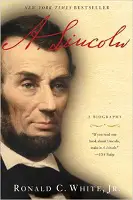 3. A. Lincoln: A Biography by Ronald C. White Jr
3. A. Lincoln: A Biography by Ronald C. White Jr
Published in 2009, this New York Times best-seller discusses the personal, political and moral evolution of Abraham Lincoln. White argues that Lincoln is a man of intellectual curiosity who is comfortable with ambiguity and is not afraid to think outside the box.
The book differs from many other Lincoln biographies because it argues that Lincoln wasn’t the inexperienced, unknown country lawyer that many historians depict him as and argues instead that he was an experienced politician who was popular throughout his home state of Illinois and was actually well known to national leaders.
History writer David W. Blight reviewed the book for the Washington Post and said it was a well-researched book and one of the best new books on the former president:
“How daunting it must be for any biographer to take on Lincoln’s life in this crowded literary marketplace! But this thoroughly researched book belongs on the A-list of major biographies of the tall Illinoisan; it’s a worthy companion for all who admire Lincoln’s prose and his ability to see into, and explain, America’s greatest crisis.”
The book was named one of the best books of the year by the Washington Post, the Philadelphia Inquirer, the Christian-Science Monitor and the St. Louis Dispatch.
White is an author who has written numerous books about Abraham Lincoln, such as Lincoln’s Greatest Speeches and The Eloquent President: A Portrait of Lincoln Through His Words, as well as number of other books on American history.
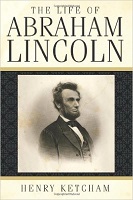 4. The Life of Abraham Lincoln by Henry Ketcham
4. The Life of Abraham Lincoln by Henry Ketcham
Published in 1901, the book is a unique firsthand account of the life of Abraham Lincoln written by a Union general who knew Lincoln well.
In the preface for the book, Ketcham states that although there were already many biographies about Lincoln by 1901, he felt compelled to write his book because he worried that without a firsthand perspective, he felt Lincoln’s legacy would be tarnished by secondhand stories and mistruths:
“It cannot be expected that a person born after the year (say) 1855, could remember Lincoln more than as a name. Such an one’s idea are made up not from his rememberance and appreciation of events as they occurred, but from what he has read and heard about them in subsequent years.”
Bookpedia.com calls the book an enjoyable read that relies heavily on personal accounts to show a more human side of Lincoln:
“The reading takes on an extended story-telling fireside chat feeling, where you know and trust the storyteller – who happens to know the kinds of things you would be interested in knowing. An excellent read…Interestingly narrated as an admirer of his life from a first hand experience.”
John Henry Ketcham, who died in 1906, was a U.S. Representative from New York and a Union General during the Civil War.
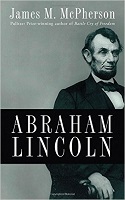 5. Abraham Lincoln: A Presidential Life by James McPherson
5. Abraham Lincoln: A Presidential Life by James McPherson
Published in 2009, the book chronicles the events of Abraham Lincoln’s life from his childhood to his presidency and also discusses Lincoln’s legacy and why he remains so popular hundreds of years later.
The book, which is less than 100 pages long, is intended to be a stripped-down, minimalist narrative of Lincoln’s life and his achievements.
In the book’s brief preface, McPherson explains that he decided to write his book because he felt that most of the Lincoln biographies published to date are too complicated and wordy:
“Most of these are substantial works; one definitive multivolume biography runs well over a half million words. Amid this cascade of information, I believe there is room for a brief biography that captures the essential events and meaning of Lincoln’s life without oversimplification or overgeneralization.”
Fellow Lincoln writers David Herbert Donald and Ronald C. White both reviewed the book and recommended it wholeheartedly. Herbert complimented the book’s concise narrative:
“A gem. Beautifully written, it is clear, concise, and correct. This is the best, very brief, biography of our sixteenth president ever written.”
While White was impressed by McPherson’s writing style:
“Abraham Lincoln at last has found his best short biography. Jim McPherson, Pulitzer Prize-winning Civil War historian, brings his vast knowledge and lucid writing to an illumination of the life of America’s most revered President. McPherson touches more Lincoln bases than any reader might reasonably expect, winning a well-deserved accolade that less is truly more.”
James McPherson is a Professor Emeritus of American History at Princeton University. He was president of the American Historical Association in 2003 and is a member of the editorial board of Encyclopedia Britannica.
McPherson has written numerous books about the Civil War such as Battle Cry of Freedom: The Civil War era; Abraham Lincoln and the Second American Revolution; For Causes and Comrades: Why Men Fought in the Civil War; and Crossroads of Freedom. McPherson won the Pulitzer-prize for Battle Cry of Freedom and also won the Lincoln Prize for For Causes and Comrades.
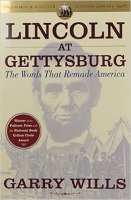 6. Lincoln at Gettysburg: The Words that Remade America by Garry Wills
6. Lincoln at Gettysburg: The Words that Remade America by Garry Wills
Published in 1992, this Pulitzer-Prize winning book discusses Lincoln’s famous Gettysburg Address and the impact it had. Wills does this by analyzing the rhetoric of the speech, which he argues was so revolutionary that it changed political speech writing forever and, as a result, “all modern political prose descends from the Gettysburg Address.”
The book argues that the speech was far ahead of its time because it justified equal rights for African-Americans on the basis of the Declaration of Independence, instead of the Constitution (which didn’t even mention equal rights until it was amended after the war.)
In doing so, Wills argues that Lincoln saw the Civil War as a battle for equal rights for African-Americans and states that his famous speech eventually paved the way for the 14th amendment, which granted citizenship to everyone born or naturalized in the U.S., including former slaves.
William McFeely, in his review of the book in The New York Times, was struck by its attention to the details of the speech:
“Mr. Wills is deadly serious about words. Perhaps the most striking element of this book is its intricate analysis of the rhetorical structure of the address. It is here that Lincoln is credited with achieving a ‘revolution in style.'”
Commentary Magazine also praised the book’s attention to detail and said the book solidifies Lincoln’s status as one of the greatest orators and statesmen in American history:
“The point of the book (itself a rhetorical tour de force) is to demonstrate that Lincoln was a brilliant rhetorician. That point has been made before, but never with so much attention given to the structure of Lincoln’s major speeches. Lincoln, we know, had mastered the first six books of Euclid’s Elements, and had studied grammar (at a time when grammar was studied seriously), but Wills shows how he employed its tools—antithesis, for example, and anaphora and asyndeton—to maximum advantage in the Gettysburg Address. It is the greatest American speech, and Lincoln was our greatest speechmaker; Wills succeeds in confirming our judgment of that. Without intending to do so, however, he also confirms our judgment that Lincoln was our greatest statesman.”
Garry Wills is a Emeritus Professor of History at Northwestern University. Wills is a frequent reviewer for the New York Times Book Review and has written over 40 books about religion and history such as James Madison (The American President Series); “Negro President”: Jefferson and the Slave Power; Nixon Agonistes: The Crisis of the Self Made Man; and Henry Adams and the Making of America.
Wills won the Pulitzer Prize and the National Book Critics Circle Award for Lincoln at Gettysburg in 1993. He also won the National Book Critics Circle Award and the Merle Curti Award for his book Inventing America in 1978.
Wills was inducted as a Laureate of The Lincoln Academy of Illinois and was awarded the Order of Lincoln by the Governor of Illinois in 2006.
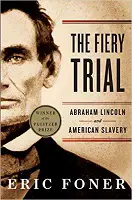 7. The Fiery Trial: Abraham Lincoln and American Slavery by Eric Foner
7. The Fiery Trial: Abraham Lincoln and American Slavery by Eric Foner
Published in 2010, the book discusses Abraham Lincoln’s views on slavery and race throughout his political career.
The book explores why Lincoln’s views on these matters changed and evolved over time and why he sometimes contradicted himself on these issues.
As Foner explains in the preface, the book is not intended to be a biography of Lincoln’s life and solely focuses on Lincoln’s role in what was called the “antislavery enterprise” of the time period, explaining that Lincoln held a relatively moderate view on the issue.
In focusing on Lincoln’s politics, Foner explains that the reader can learn more about Lincoln himself as well as more about the Civil War-era in general:
“But I believe that casting a bright, concentrated light on Lincoln and the politics of slavery – with politics defined in the broadest sense, not simply as elections and office-holding but the shaping of opinion with the extended public sphere, can illuminate his life and his era in new ways.”
David S. Reynolds reviewed the book for The New York Times and praised it for its fresh, new perspective:
“Do we need yet another book on Lincoln?… Well, yes, we do if the book is by so richly informed a commentator as Eric Foner. Foner tackles what would seem to be an obvious topic, Lincoln and slavery, and manages to cast new light on it…. Because of his broad-ranging knowledge of the 19th century, Foner is able to provide the most thorough and judicious account of Lincoln’s attitudes toward slavery that we have.”
Fellow Lincoln biographer, James M. McPherson also reviewed the book and stated that “No one else has written about [Lincoln’s] trajectory of change with such balance, fairness, depth of analysis, and lucid precision of language.”
The Library Journal dubbed it “an essential work for all Americans. In the vast library on Lincoln, Foner’s book stands out as the most sensible and sensitive reading of Lincoln’s lifetime involvement with slavery and the most insightful assessment of Lincoln’s—and indeed America’s—imperative to move toward freedom lest it be lost.”
David M. Shribman, reviewed the book for the Boston Globe and said it was “a masterwork that examines Lincoln’s passage to Gettysburg and beyond.”
Another fellow Lincoln author, Fred Kaplan, wrote a negative review of the book for the Washington Post and argued that Foner merely created a thesis to fit his narrative:
“Foner’s justification for The Fiery Trial is that ‘there is value in tracing Lincoln’s growth, as it were, forward.’ ‘As it were’ reveals a nice hesitancy or qualification that the book as a whole doesn’t maintain. Foner’s basic claim is at least an exaggeration, if not wrong. A stronger argument can be made that Lincoln hardly ‘grew at all on the issue of slavery, that he responded to changing circumstances that he did not create and that brought him into a public role in which he could not avoid taking the positions that led to the Emancipation Proclamation and the 13th Amendment. But Foner’s narrative almost requires that his main character develop morally. The Fiery Trial maintains this thesis despite the facts that it narrates.”
The only positive thing that Kaplan had to say about the book is that it was essentially a comprehensive record of all the previous books and sources on Lincoln and slavery, making it a basic reference guide on the topic: “this will now be the book of first convenience to go to on the subject.”
Eric Foner is a history professor at Columbia University. Foner was elected president of the American Historical Association in 2001.
Foner has written many books about Lincoln as well as the Civil War such as Our Lincoln: New Perspectives on Lincoln and His World; Gateway to Freedom: The Hidden History of the Underground Railroad; and A House Divided: America in the Age of Lincoln.
Foner won the Pulitzer-Prize, the Bancroft Prize and the Lincoln Prize for the Fiery Trial in 2011 and the book was named Notable Book of the Year by the New York Times.
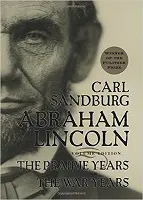 8. Abraham Lincoln: The Prairie Years and the War Years by Carl Sandburg
8. Abraham Lincoln: The Prairie Years and the War Years by Carl Sandburg
Originally published as six volumes in the 1930s, the book chronicles the events of Abraham Lincoln’s life starting from his early years and continuing to his presidency and assassination.
The books, which originally consisted of a two volume book titled Abraham Lincoln: The Prairie Years and a four volume book titled Abraham Lincoln: The War Years, were later condensed into one volume. The Prairie Years covers Lincoln’s early life up until 1850 and the War Years covers the second half of his life up to his assassination.
As Sandburg explains in the preface, he knew Civil War veterans as a young child and often listened to the stories of men who knew Lincoln personally.
Upon hearing these stories, he became fascinated with Lincoln and decided to write a biography about Lincoln’s time as a country lawyer in the midwest. After writing the book, Sandburg discovered Lincoln had grown on him so much that he decided to write another book about him which then led to even more books.
The books were well received by critics and the public alike when they were published and became instant classics on the subject. Upon publication of the War Years in 1939, the New Republic Magazine reviewed it and said no other historical book could compare:
“With these four volumes Carl Sandburg completes the life of Lincoln begun in “The Prairie Years.” Taking the total achievement, there is nothing in historical literature that I know quite comparable with it.”
The website BestPresidentialbios.com says although the book is very good, the first volume, the Prairie Years doesn’t quite hold up for modern readers:
“Overall, Carl Sandburg’s ‘The Prairie Years’ is a fascinating and enjoyable cultural and literary experience, even if disappointing from a historical perspective. For many reasons it is not ideal as an introduction to Abraham Lincoln for the modern reader seeking a comprehensive, detailed and historically potent account of his life. But as a second or third source, designed to add splashes of color and flavor unavailable elsewhere, Sandburg’s work on Lincoln’s early years is quite well-suited.”
The website’s review of the War Years explains that although it is “a jewel of American history” and is “impressive in scope” it is so dense and detailed that it is a bit overwhelming at times, which might explain why the books were eventually condensed into a single volume, to make it more accessible to modern readers.
The original six volume editions are now out of print but used copies and reprints can still be purchased on Amazon and other websites.
Carl Sandburg, who died in 1967, was a poet, editor and author. Sandburg wrote many notable volumes of poetry, such as Chicago Poems and The Complete Poems of Carl Sandburg as well as children’s books.
Sandburg won the Pulitzer Prize for his book of poems The Completed Poems of Carl Sandburg in 1951 and won the Pulitzer Prize for history for his book Abraham Lincoln: The War Years in 1940.
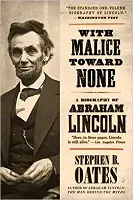 9. With Malice Toward None: A Life of Abraham Lincoln by Stephen B. Oates
9. With Malice Toward None: A Life of Abraham Lincoln by Stephen B. Oates
Published in 1977, the book chronicles the life of Abraham Lincoln from birth to death. Oates explained in the preface of his book, that while writing the book he became completely absorbed in Lincoln’s daily life and hoped his readers experienced the same feeling:
“I hope that my readers have a similar sensation when they put the book down. If I have done my job properly as a biographer, they will willingly suspend their knowledge of how the story ends and allow my narrative to transport them back into Lincoln’s world, where they can walk with him as his life unfolds, sharing in his humanity.”
The book became entangled in controversy in 1990 when Oates was accused of plagiarizing passages of Benjamin Thomas’ 1952 biography of Lincoln. Oates issued a rebuttal, as he states in the preface of an updated version of his book:
“After studying the allegations, I issued a public rebuttal, pointing out that Lincoln literature consists of a common body of knowledge about him, particularly his well-known early years, that has accumulated for more than a century and is in the public domain. If there are similarities between my book and Thomas’s, I said, it is because both biographies draw from that common ‘text’ or body of writing and information…In writing With Malice Toward None, to borrow Potter’s words, I took the ‘bits and pieces’ of the Lincoln biographical tradition and tried to weave it into a ‘new discourse.’”
Oates was later cleared of the plagiarism charges by the American Historical Association.
The book was well received by critics when it was published. The Chicago Tribune declared it “a superb biography” and the Washington Post said it was “The standard one-volume biography of Lincoln.” The Boston Globe said the book has been “Hailed as the best one-volume biography of Lincoln.”
According to the website PresidentialBios.com, when the book was published, it became the best Lincoln biography to date and held that title for decades until Donald’s biography was published in the 90s:
“Oates’s biography was the first comprehensive treatment of Lincoln in nearly two decades. Critically hailed, it quickly gained a reputation as ‘the’ standard Lincoln biography, replacing Benjamin Thomas’s 1952 biography in that role. Not until David Herbert Donald’s universally acclaimed ‘Lincoln’ was published in 1995 did Oates’s biography relinquish its prominence.”
Stephen B. Oates is a former history professor at the University of Massachusetts Amherst and is considered an expert on 19th century history. Oates wrote 16 history books, many of them about 19th and 20th century history, such as Let the Trumpet Soar: A Life of Martin Luther King, Jr; Woman of Valor: Clara Barton of the Civil War; and the Approaching Fury: Voices of the Storm, 1820-1861.
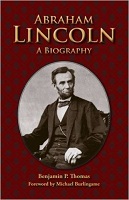 10. Abraham Lincoln: A Biography by Benjamin Thomas
10. Abraham Lincoln: A Biography by Benjamin Thomas
Published in 1952, the book details the events of Abraham Lincoln’s life from his early life to his presidency.
Instead of idolizing Lincoln, the book portrays him as a balanced individual with the conviction and inner strength to lead the country.
In the preface of the book, Thomas explains that he wrote the biography because there weren’t any reliable one-volume books on Lincoln at the time:
“There has been no accurate, readable, one-volume biography for the Lincoln beginner, for the person who can devote only a small portion of his time learning about Lincoln, or for the high-school teacher or college professor who wishes to include a reasonably short life of Lincoln on his student’s reading list…So it is my hope that this book will fill a long-felt want. It is intended primarily for the reading public rather than for the expert, though I hope that the experts will approve of it. And I believe that even they will discover that it offers new interpretations and reveal many unknown facts.”
In the book’s forward, fellow Lincoln author, Michael Burlingame, wrote that he still considers Thomas’ book to be the best single-volume book on Lincoln despite all of the new biographies that have been published since:
“Published over a half a century ago, Benjamin P. Thomas’s Abraham Lincoln: A Biography remains the best single-volume life of the sixteenth president. The only other serious contender for that designation is David Herbert Donald’s 1995 biography, but as critic Jonathan Yardley rightly noted, ‘in no significant way does Donald’s Lincoln supplant Benjamin Thomas’s.’ In Yardley’s view, the Thomas biography is ‘the definitive work’ for readers ‘looking for Lincoln at once in full and brief.’ Prominent historians share Yardley’s enthusiasm. In 1999, Allen C. Guelzo, two-time winner of the prestigious Lincoln Prize and author of Abraham Lincoln: Redeemer President; Lincoln and Douglas: The Debates That Defined America; and Lincoln’s Emancipation Proclamation: The End of Slavery in America, described Thomas’s Lincoln as ‘the finest one-volume survey biography’ of the sixteenth president. Mark E. Neely, Jr., who won the Pulitzer Prize for his monograph The Fate of Liberty: Abraham Lincoln and Civil Liberties, deemed Thomas’s book ‘wonderful,’ a ‘masterpiece,’ an ‘elegant and balanced synthesis’ resting on ‘the best research’ and written in a ‘fluid and readable style.’”
Benjamin Thomas, who died in 1956, was a history professor at Birmingham-Southern College and the author of multiple books about Lincoln, Abraham Lincoln: A Biography; Lincoln, 1847–1853: Being the Day-by-Day Activities of Abraham Lincoln from January 1, 1847; Lincoln’s New Salem; and Portrait of Posterity: Lincoln and His Biographers. Thomas also served as the director and then treasurer of the Abraham Lincoln Association in 1939 and 1942.
Additional Reading:
♠ Abraham Lincoln: A Life, Volume One and Two by Michael Burlingame
♠ Lincoln: The Biography of a Writer by Fred Kaplan
♠ Abraham Lincoln: A History, Volumes 1-10 by John M. Hay and John George Nicolay
♠ Abraham Lincoln: an Essay by Carl Schurz
♠ The Life of Abraham Lincoln, Volumes One & Two by Ida M. Tarbell
Sources:
Journal of the Abraham Lincoln Association: Benjamin P. Thomas: quod.lib.umich.edu/j/jala/2629860.0019.204/–benjamin-p-thomas?rgn=main;view=fulltext
Best Presidential Bios: Review of Abraham Lincoln: A Biography by Benjamin Thomas: bestpresidentialbios.com/2014/04/14/review-of-abraham-lincoln-a-biography-by-benjamin-thomas/
New York Times; Call Him Elequent Abe, the Writer in Chief; Michiko Kakutani; November 2008: nytimes.com/2008/11/07/books/07book.html
Chicago Tribune; Controversy Hits Accuser and Accused; Patrick T. Reardon; December 1990: http://articles.chicagotribune.com/1990-12-11/news/9004120516_1_lincoln-scholar-plagiarism-stephen-b-oates
Best Presidential Bios: Review of Abraham Lincoln: The War Years by Carl Sandburg: bestpresidentialbios.com/2014/05/24/review-of-abraham-lincoln-the-war-years-by-carl-sandburg/
New Republic; Lincolns as War Leader; Max Lerner; December 1939: newrepublic.com/article/80144/carl-sandburg-abraham-lincoln-war-leader
Washington Post; Eric Foner’s Book on Lincoln and Slavery, Reviewed by Fred Kaplan; November 2010: washingtonpost.com/wp-dyn/content/article/2010/11/28/AR2010112802826.html
New York Times; Learning to be Lincoln; David S. Reynolds; September 2010:
Commentary Magazine; Lincoln at Gettysburg by Garry Wills; Walter Berns; November 1992: commentarymagazine.com/articles/lincoln-at-gettysburg-by-garry-wills/
New York Times; How We Were Created Equal; William McFreely; June 1992: nytimes.com/books/98/12/06/specials/wills-lincoln.html
Washington Post; Abe the Intellectual; David W. Blight; February 2009: washingtonpost.com/wp-dyn/content/article/2009/02/05/AR2009020503121.html
Best Presidential Bios: Review of Lincoln by David Herbert Donald: bestpresidentialbios.com/2014/03/29/review-of-lincoln-by-david-herbert-donald/
History Net: Book Review: Lincoln (David Herbert Donald): historynet.com/book-review-lincoln-david-herbert-donald-cwt.htm
New York Times; Before He Became a Saint; Geoffrey C. Ward; October 1995: nytimes.com/1995/10/22/books/before-he-became-a-saint.html?pagewanted=all
History.net: Team of Rivals: The Political Genius of Abraham Lincoln (Book Review):historynet.com/team-of-rivals-the-political-genius-of-abraham-lincoln-book-review.htm
New York Times: ‘Team of Rivals’ Friends of Abe by James McPherson: nytimes.com/2005/11/06/books/review/team-of-rivals-friends-of-abe.html?_r=0
Business Insider; There Are About 15,000 Books on Abraham Lincoln – Here Are 7 You Should Read: businessinsider.com/best-books-on-abraham-lincoln-2015-2
Pin it for later:
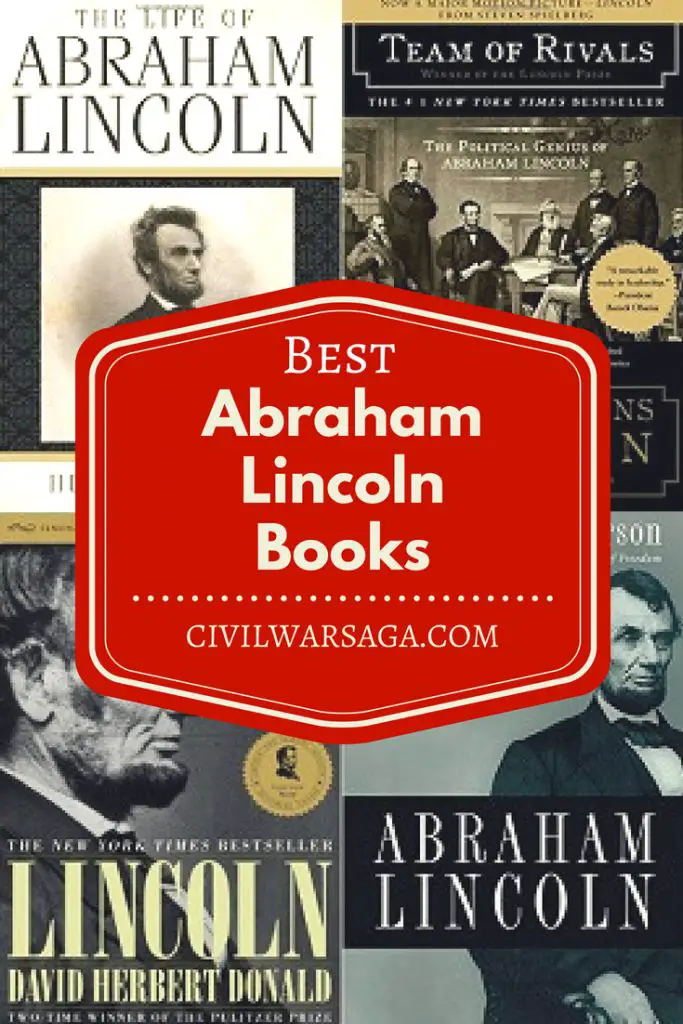

Thanks for this list! Reading Donald’s book right now, and have a couple of the others on my “reading list,” but here are some others I was unaware of. FWIW, your post reminded me of this wonderful Lincoln “monument” in DC. The photos, while impressive, just can’t quite do it justice, It must be seen in person to truly appreciate it:
atlasobscura.com/places/lincoln-book-tower